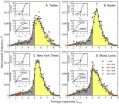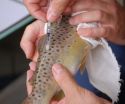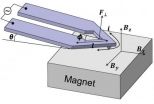(Press-News.org) TORONTO, Ont., Jan. 12, 2012—Researchers at St. Michael's Hospital have published the first detailed figures showing the risk of using the prescription drug Rasilez in combination with certain other blood pressure-lowering medications.
The pharmaceutical company Novartis terminated a large, international clinical trial of the drug last month after finding an increased incidence after 18-24 months of non-fatal strokes, renal complications, high levels of potassium in the blood and low blood pressure.
As a result, Health Canada said on Dec. 22 that it would review the safety of Rasilez, the brand name for aliskiren.
Even before Novartis halted its clinical trial, Dr. Ziv Harel and other researchers at St. Michael's were examining the interaction between Rasilez and angiotensin converting enzyme (ACE) inhibitors or angiotensin receptor blocker (ARB) drugs.
After reviewing 10 large randomized clinical trials on the combination of these drugs, they found that patients taking Rasilez as well as an ACE inhibitor or ARB, had about a 50 per cent greater risk of developing hyperkalemia – high levels of potassium in the blood – than those taking only an ACE inhibitor or ARB.
As well, patients taking a combination of Rasilez plus an ACE inhibitor or ARB had a 70 per cent greater risk of developing hyperkalemia than those taking Rasilez alone. Hyperkalemia can lead to an irregular heartbeat or increased risk of cardiac arrest.
Their analysis of the clinical trials was fast-tracked into publication this week in the British Medical Journal. It provided the first specific data of the risks of taking the drug combinations. Data was released from the halted Novartis trial, but a detailed analysis was not reported.
Previous research in 2008 found an increased risk of hyperkalemia and acute kidney failure in people taking a combination of ACE inhibitors and ARBs. So when Rasilez entered the market, clinicians were keen to replace one of those drugs in the combination. The number of prescriptions for Rasilez in Ontario rose from 56,602 in 2009 to 119,891 in 2010.
Dr. Harel, a nephrologist, said he was surprised to find no increased risk of kidney failure in patients taking Rasilez and an ACE inhibitor or ARB over those taking just one of the drugs. He said that might be because the short-term clinical trials they reviewed used a conservative definition of kidney failure or the patients were being monitored so closely that any sign of kidney damage would have been detected and treated quickly.
Dr. Harel said he believes that clinicians should offer alternatives to prescribing combinations of medications with a strong potential for life-threatening adverse events.
INFORMATION:
About St. Michael's Hospital
St. Michael's Hospital provides compassionate care to all who enter its doors. The hospital also provides outstanding medical education to future health care professionals in more than 23 academic disciplines. Critical care and trauma, heart disease, neurosurgery, diabetes, cancer care, and care of the homeless are among the Hospital's recognized areas of expertise. Through the Keenan Research Centre and the Li Ka Shing International Healthcare Education Center, which make up the Li Ka Shing Knowledge Institute, research and education at St. Michael's Hospital are recognized and make an impact around the world. Founded in 1892, the hospital is fully affiliated with the University of Toronto.
For more information or to interview Dr. Harel, please contact:
Leslie Shepherd
Manager, Media Strategy
Phone: 416-864-6094
shepherdl@smh.ca
St. Michael's Hospital
Inspired Care. Inspiring Science.
www.stmichaelshospital.com
Follow us on Twitter: http://www.twitter.com/stmikeshospital
END
A new study published in the journal Nature Medicine by NYU Cancer Institute researchers, shows how the cancer causing gene Notch, in combination with a mutated Polycomb Repressive Complex 2 (PRC2) protein complex, work together to cause T- cell acute lymphoblastic leukemia (T-ALL).
T-ALL is an aggressive blood cancer, predominately diagnosed in children. It occurs when one lymphoblast, an immature white blood cell, turns malignant, multiplying uncontrollably and spreading rapidly throughout the body. If left untreated, the disease can be fatal in a few weeks. Cancer-causing ...
WEST LAFAYETTE, Ind. - Honeybee populations have been in serious decline for years, and Purdue University scientists may have identified one of the factors that cause bee deaths around agricultural fields.
Analyses of bees found dead in and around hives from several apiaries over two years in Indiana showed the presence of neonicotinoid insecticides, which are commonly used to coat corn and soybean seeds before planting. The research showed that those insecticides were present at high concentrations in waste talc that is exhausted from farm machinery during planting.
The ...
"If it bleeds, it leads," goes the cynical saying with television and newspaper editors. In other words, most news is bad news and the worst news gets the big story on the front page.
So one might expect the New York Times to contain, on average, more negative and unhappy types of words — like "war," " funeral," "cancer," "murder" — than positive, happy ones — like "love," "peace" and "hero."
Or take Twitter. A popular image of what people tweet about may contain a lot of complaints about bad days, worse coffee, busted relationships and lousy sitcoms. Again, it might ...
TAMPA, Fla. (Jan. 12, 2012) – Using two cell surface markers found to be highly expressed in breast cancer lymph node metastases, researchers at Moffitt Cancer Center, working with colleagues at other institutions, have developed targeted, fluorescent molecular imaging probes that can non-invasively detect breast cancer lymph node metastases. The new procedure could spare breast cancer patients invasive and unreliable sentinel lymph node (SLN) biopsies and surgery-associated negative side effects.
Their study was published in a recent issue of Clinical Cancer Research ...
For years, researchers seeking new therapies for traumatic brain injury have been tantalized by the results of animal experiments with stem cells. In numerous studies, stem cell implantation has substantially improved brain function in experimental animals with brain trauma. But just how these improvements occur has remained a mystery.
Now, an important part of this puzzle has been pieced together by researchers at the University of Texas Medical Branch at Galveston. In experiments with both laboratory rats and an apparatus that enabled them to simulate the impact of ...
Researchers at the University of Oviedo (Spain) have come up with a way of tagging gunpowder which allows its illegal use to be detected even after it has been detonated. Based on the addition of isotopes, the technique can also be used to track and differentiate between wild fish and those from a fish farm, such as trout and salmon.
A new method for tagging and identifying objects, substances and living beings has just been presented in this month's issue of the Analytical Chemistry journal. Its creators are scientists at the University of Oviedo who have patented the ...
A new study on African bats provides a vital clue for unravelling the mysteries in Australia's battle with the deadly Hendra virus.
The study focused on an isolated colony of straw-coloured fruit bats on islands off the west coast of central Africa. By capturing the bats and collecting blood samples, scientists discovered these animals have antibodies that can neutralise deadly viruses known in Australia and Asia.
The paper is published today, 12 January, in the journal PLoS ONE, and is a collaboration of the Department of Veterinary Medicine at the University of ...
Polymer nano-films and nano-composites are used in a wide variety of applications from food packaging to sports equipment to automotive and aerospace applications. Thermal analysis is routinely used to analyze materials for these applications, but the growing trend to use nanostructured materials has made bulk techniques insufficient.
In recent years an atomic force microscope-based technique called nanoscale thermal analysis (nanoTA) has been employed to reveal the temperature-dependent properties of materials at the sub-100 nm scale. Typically, nanothermal analysis ...
BOSTON, January 12, 2012: A research collaboration between the Wyss Institute for Biologically Inspired Engineering at Harvard University and Children's Hospital Boston has developed "smart" injectable nanotherapeutics that can be programmed to selectively deliver drugs to the cells of the pancreas. Although this nanotechnology will need significant additional testing and development before being ready for clinical use, it could potentially improve treatment for Type I diabetes by increasing therapeutic efficacy and reducing side effects.
The approach was found to increase ...
SANTA CRUZ, CA--Robotics experts at the University of California, Santa Cruz and the University of Washington (UW) have completed a set of seven advanced robotic surgery systems for use by major medical research laboratories throughout the United States. After a round of final tests, five of the systems will be shipped to medical robotics researchers at Harvard University, Johns Hopkins University, University of Nebraska, UC Berkeley, and UCLA, while the other two systems will remain at UC Santa Cruz and UW.
"We decided to follow an open-source model, because if all ...


